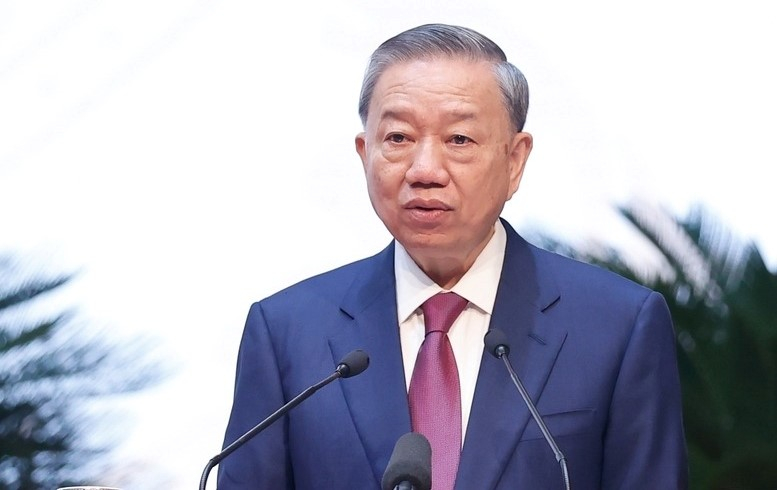Digital transformation key development driver for Vietnam in ‘new era’: Party chief
Vietnam sees digital transformation as a critical development driver in the new era, exerting great impacts on productive forces and production relations, Party General Secretary and State President To Lam has affirmed.
In an article written on the occasion of National Day (September 2), Lam highlighted the role digital transformation would play in the country’s future prosperity.

Party General Secretary and State President To Lam. Photo courtesy of Vietnam News Agency.
He recalled a transformation in production relations and the building of a socialist-oriented market economy in Vietnam after the country regained independence in 1945 under the Party’s leadership.
From 1979 until the sixth National Party Congress in 1986, Vietnam experienced severe crises, partly due to non-uniformity between productive forces and production relations. The productive forces were restrained not only in the case of backward production relations but also when some elements of production relations greatly surpassed the development level of productive forces.
Resolution 10-NQ/TW dated April 5, 1988 of the Politburo was a breakthrough step in reforming production relations in agriculture when it officially recognized the household as an independent economic unit. The resolution allowed the handover of long-term land use rights to farmers.
In just one year after implementing the resolution, Vietnam managed to overcome a long period of food shortage and exported 1.2 million tons of rice for the first time.
“The appropriate adjustment of production relations created a new motivation for the development of productive forces, taking the country out of crisis and into a period of all-round renewal and international integration,” Lam wrote.
More than three decades after initiating the Doi moi process in 1986, Vietnam is expected to record an average GDP growth rate of 5.7-5.9% per year in the 2021-2025 period, ranking it among the fastest-growing economies in the region and the world.
Its GDP is projected to top $500 billion by 2025, resulting in a per capita income of approximately $4,650, positioning Vietnam in the upper-middle-income group.
By the same year, Vietnam’s workforce is expected to reach 53.2 million people, with the proportion of laborers in agriculture forecast to decrease significantly to 25.8%. Around 70% of the workforce will have received training.
“The focus will be on developing high-quality human resources that can meet the demands of the Fourth Industrial Revolution in key areas such as semiconductors, artificial intelligence (AI) and information technology, gradually forming a contingent of workers with increasingly enhanced digital thinking and skills.”
Lam stressed that AI, Internet of Things (IoT), big data, and cloud computing were gradually becoming essential production tools across various industries and sectors. Infrastructure, particularly digital infrastructure, was being developed strongly. Telecommunications and broadband internet networks have extended coverage over the entire country, providing a foundation for developing the digital economy and digital society.
Development of production tools in the digital economy was creating profound changes in productive forces, leading to conflicts with existing production relations, he noted.
“While new productive forces are forming and developing rapidly, there remains a gap between the quality of human resources and the requirements of the country’s development in this new phase. Training of human resources, particularly those working in the high-tech sector, remains a significant challenge. Production relations still contain many inadequacies, failing to catch up with the development of productive forces.”
Meanwhile, mechanisms, policies and laws have not synchronized fully and overlapping remains, thus failing to create a truly favorable environment to attract resources from both domestic and foreign investors, as well as from the people in general. Implementation of laws and policies remains a weak link, Lam said.
He pointed out that there were limitations in administrative reforms and the development of e-government and digital government.

Digitalization is providing Vietnamese citizens with better quality services, like submitting passport applications online. Photo courtesy of Pháp luật TP. HCMC (HCMC Law) newspaper.
A revolution
Vietnam should carry out a revolution with robust and comprehensive reforms to adjust production relations and create new motives for development. Digital transformation with the application of science and technology was such a revolution that would restructure production relations, making them align with the outstanding progress of productive forces, Lam said.
Digital transformation was not merely the application of digital technology in socio-economic activities but also the process of establishing a new, advanced and modern mode of production – the "digital production mode", in which the prominent characteristic of productive forces was the harmonious combination between humans and artificial intelligence, with data becoming a resource and an important means of production; and production relations also undergoing profound changes, particularly in the form of ownership and distribution of digital means of production.
Changes in production relations will create major impacts on the superstructure, open up a new mode of social governance, create new tools in state management and fundamentally change the interaction between the State and citizens, and between social classes.
The Party chief outlined four key tasks to realize the nation’s digital transformation targets.
The first task is to complete mechanisms and legal system, steadfastly pursuing the goal of a socialist-oriented market economy while keeping up with development trends of the era. For this, it is important to build legal corridors for the digital economy and enact strong mechanisms and policies to promote digital transformation in all socio-economic sectors, encouraging innovation and protecting intellectual property rights.
The second task is to unleash and maximize all resources in society, creating: suitable mechanisms and policies to mobilize enormous resources; and an open and transparent investment climate to draw both domestic and foreign investment for science technology development and innovation. This would also include maximizing human resources and creating breakthrough mechanisms to attract domestic and foreign talents; and building a strategy to develop human resources with adequate knowledge, skills, and innovative and creative minds.
The third task is to reform and build a streamlined and effective state apparatus. This requires slashing unnecessary intermediaries; accelerating decentralization and delegation of power in tandem with enhancing inspection and supervision; perfecting inspection and supervision mechanisms; promoting application of information technology, building a digital platform to connect and share data among agencies and organizations.
The goal is to become one of top 50 leading countries in the world and the third in ASEAN in terms of e-government and digital economy by 2030.
The fourth task is to promote digital transformation alongside ensuring security and safety. This task requires a focus on building a digital society, comprehensively digitalizing state management activities and providing high-level online public services.
- Read More
Quang Ngai Sugar develops sugar, biomass power projects worth $179 mln in central Vietnam
Quang Ngai Sugar JSC (UPCom: QNS), a top sugar producer in Vietnam, will simultaneously hold groundbreaking or inauguration ceremonies on Friday for three projects worth over VND4.7 trillion ($178.5 million) in Gia Lai province.
Companies - Fri, December 19, 2025 | 8:05 am GMT+7
Vietnam defeat Thailand to win men’s football gold at SEA Games 33
After conceding two goals in just over 30 minutes, Vietnam reversed the situation to finally beat host nation Thailand 3-2 in the men’s football final of the 33rd SEA Games.
Society - Thu, December 18, 2025 | 10:43 pm GMT+7
Sun Group to commence construction on 5 landmark projects worth $5.7 bln
Sun Group is scheduled to start construction of five large-scale projects across Vietnam’s three regions on Friday, with a total investment of nearly $5.7 billion.
Companies - Thu, December 18, 2025 | 8:39 pm GMT+7
Unpaid credit card balances in Singapore hit record high in 10 years
Singapore's credit card debt has exceeded SGD9.07 billion (about $7 billion) in 2025's third quarter, a 10-year high that was last seen in 2014.
Southeast Asia - Thu, December 18, 2025 | 7:54 pm GMT+7
Thailand, Japan deepen transport, infrastructure cooperation
Thai Deputy Prime Minister and Minister of Transport Phiphat Ratchakitprakarn has met with Japanese Ambassador Otaka Masato to advance cooperation in Thailand’s transportation and infrastructure projects.
Southeast Asia - Thu, December 18, 2025 | 7:50 pm GMT+7
Masan's FMCG arm MCH to list on HCMC bourse at $8 per share, valuation tops $8.6 bln
Masan Consumer Corporation (UpCoM: MCH), the fast-moving consumer goods arm of Vietnam’s Masan Group, will officially debut on the Ho Chi Minh City Stock Exchange (HoSE) on December 25, with a reference price set at VND212,800 ($8.08) per share.
Companies - Thu, December 18, 2025 | 4:57 pm GMT+7
Sun Group-led consortium to build $616 mln Red River bridge in Hanoi
Hanoi authorities have approved a consortium led by Sun Group as the investor for the Tran Hung Dao bridge project, with a total investment estimated at VND16.27 trillion ($616.14 million).
Infrastructure - Thu, December 18, 2025 | 3:26 pm GMT+7
Shinhan Bank Vietnam accompanies SMEs in promoting cashless payments
With modern, secure and convenient payment solutions designed to meet the specific needs of businesses, particularly the SME segment, Shinhan Bank Vietnam continues to accompany enterprises in building a modern corporate image and keeping pace with the digital economy.
Banking - Thu, December 18, 2025 | 2:10 pm GMT+7
JC&C to divest 4.6% stake at Vietnam's dairy giant Vinamilk to F&N for $228 mln
Singapore-listed Jardine Cycle & Carriage Limited (JC&C) has announced the sale of more than 96 million shares, or a 4.6% stake, in Vietnam’s dairy giant Vinamilk (HoSE: VNM) to F&N Dairy Investments Pte. Ltd., part of the Fraser and Neave (F&N) group controlled by Thai billionaire Charoen Sirivadhanabhakdi.
Companies - Thu, December 18, 2025 | 1:36 pm GMT+7
Siemens to supply high-speed trains, key railway systems to Vingroup's subsidiary VinSpeed
Siemens Mobility on Wednesday signed a comprehensive strategic cooperation and high-speed railway technology transfer agreement with VinSpeed, a unit of Vietnam’s Vingroup, to supply high-speed trains and key railway systems for planned rail projects in Vietnam.
Companies - Thu, December 18, 2025 | 1:24 pm GMT+7
Hanoi administration to raise over $52 mln from Thuong Dinh Footwear divestment
Hanoi’s municipal government is set to raise nearly VND1.38 trillion ($52.35 million) from the sale of its entire 68.67% stake in Thuong Dinh Footwear Company - a major footwear producer in Vietnam, after two individual investors agreed to buy all shares on offer at a price far above market levels.
Companies - Thu, December 18, 2025 | 10:01 am GMT+7
Sony Music to acquire 49% stake at Vietnam's YeaH1 subsidiary
Sony Music Entertainment Hong Kong Ltd. will invest in a unit of YeaH1 (HoSE: YEG), a leading media entertainment technology group in Vietnam, through a private placement, acquiring a 49% stake and reducing YeaH1’s ownership to 49.88%.
Companies - Thu, December 18, 2025 | 8:34 am GMT+7
Honda Vietnam expands biz registration to cover electric vehicles, charging, battery swapping
Honda Vietnam (HVN) has formally expanded its registered business lines to include electric vehicles, charging infrastructure, and battery-swapping services, marking its most comprehensive step into the electric mobility ecosystem to date.
Companies - Wed, December 17, 2025 | 5:16 pm GMT+7
Vietnam tech unicorn VNG merges two core units into AI-focused GreenNode brand
Vietnamese tech unicorn VNG (UPCoM: VNZ) has merged its cloud computing arm VNG Cloud with AI infrastructure unit GreenNode into the AI-focused GreenNode brand, marking a key step in the company’s “AI-first” strategy.
Companies - Wed, December 17, 2025 | 3:51 pm GMT+7
Becamex to inject $28 mln into VSIP Industrial Park joint venture
Becamex Group (HoSE: BCM) plans to inject an additional VND735 billion ($27.9 million) into the Vietnam-Singapore Industrial Park J.V. Co., Ltd (VSIP JV), as the leading Vietnamese developer steps up investment across its industrial property portfolio.
Companies - Wed, December 17, 2025 | 12:50 pm GMT+7
Vietnam M&A 2025: Opportunities reshaped by disciplined capital
Vietnam’s M&A activity through the first 10 months of 2025 shows a market steadily regaining balance after two volatile years, with dealmaking shaped by rising selectivity, clearer regulatory signals and the return of larger, higher-conviction transactions, write KPMG analysts.
Consulting - Wed, December 17, 2025 | 12:44 pm GMT+7


























